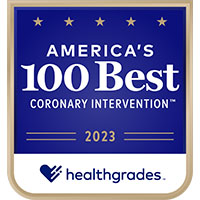Saint Vincent Hospital Raising Awareness about Colorectal Cancer Month
Mar 24, 2023WORCESTER, Mass. – March is Colorectal Cancer Awareness Month and Saint Vincent Cancer & Wellness Center is raising awareness of this potentially life-threatening disease. The good news is that colorectal cancer is preventable, treatable, and beatable.
What is colorectal cancer?
Colorectal cancer is a disease characterized by the unchecked division of abnormal cells in the colon or rectum. The colon and rectum (colorectum), along with the anus, make up the large intestine, the final segment of the gastrointestinal (GI) system. Most colorectal cancers start as a growth, or polyp, on the inner lining of the colon or rectum.
The Stats
While an uncommon topic of conversation, it’s important to talk about and to get screened. Excluding skin cancers, colorectal cancer is the fourth most common cancer (after prostate, breast and lung) diagnosed in both men and women in the United States. The American Cancer Society estimates the following statistics for colorectal cancer cases in the United States for 2020:
- 104,610 new cases of colon cancer
- 43,340 new cases of rectum cancer
Screenings are important
Many lifestyle-related factors have been linked to colorectal cancer. The links between diet, weight and exercise and colorectal cancer risk are some of the strongest for any type of cancer.
“Regular colorectal cancer screening is one of the best ways for preventing colorectal cancer. With regular screening, most polyps can be found and removed before they have the chance to turn up into cancer,” said Dr. Ahmad Siddiqui, Medical Director of Saint Vincent Cancer & Wellness Center.
Men and women aged 45 or older, should start getting screened for colorectal cancer. There’s an increase in colorectal cancer cases that are impacting patients in their 20’s and 30’s. The reasoning for this increase may be related to dietary changes. For example, high fat diets from an early age alter bacteria in the intestines that may predispose to cancer. The same occurs with low fiber diets – meaning lacking fruit and grains – which may alter the healthy bacteria in the intestines.
There are currently no formal screening guidelines for colorectal cancer patients in their 20’s and 30’s, except in the instance of a strong family history, a known genetic mutation or history of intestinal polyposis. A genetic DNA test may be an alternative screening.
Listen to your body
Colorectal cancer might not cause symptoms right away. If it does, it may cause one or more of these symptoms:
- Change in bowel habits that last more than a few days
- Feeling that you need to have bowel movement that’s not relieved by having one
- Rectal bleeding or blood in the stool
- Cramping or abdominal pain
- Weakness and fatigue
- Unintended weight loss
“It’s important to know many of these symptoms can be caused by conditions other than colorectal cancer,” Dr. Siddiqui explained. “Still, if you have any of these problems, it’s important to see your doctor right away. Early screening and detection of colorectal cancer is crucial.”
To learn more about Saint Vincent Cancer & Wellness Center, visit our webpage here, and take our free colorectal cancer quiz here.


 Saint Vincent Hospital is proud to be named One of America’s Best Coronary Intervention Hospitals for 2023 by Healthgrades! This distinction places us in the top 5% of hospitals nationwide for coronary intervention.
Saint Vincent Hospital is proud to be named One of America’s Best Coronary Intervention Hospitals for 2023 by Healthgrades! This distinction places us in the top 5% of hospitals nationwide for coronary intervention.